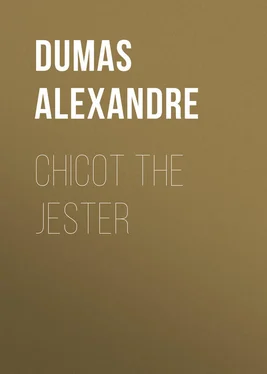Alexandre Dumas - Chicot the Jester
Здесь есть возможность читать онлайн «Alexandre Dumas - Chicot the Jester» — ознакомительный отрывок электронной книги совершенно бесплатно, а после прочтения отрывка купить полную версию. В некоторых случаях можно слушать аудио, скачать через торрент в формате fb2 и присутствует краткое содержание. Жанр: literature_19, foreign_antique, foreign_prose, на английском языке. Описание произведения, (предисловие) а так же отзывы посетителей доступны на портале библиотеки ЛибКат.
- Название:Chicot the Jester
- Автор:
- Жанр:
- Год:неизвестен
- ISBN:нет данных
- Рейтинг книги:5 / 5. Голосов: 1
-
Избранное:Добавить в избранное
- Отзывы:
-
Ваша оценка:
- 100
- 1
- 2
- 3
- 4
- 5
Chicot the Jester: краткое содержание, описание и аннотация
Предлагаем к чтению аннотацию, описание, краткое содержание или предисловие (зависит от того, что написал сам автор книги «Chicot the Jester»). Если вы не нашли необходимую информацию о книге — напишите в комментариях, мы постараемся отыскать её.
Chicot the Jester — читать онлайн ознакомительный отрывок
Ниже представлен текст книги, разбитый по страницам. Система сохранения места последней прочитанной страницы, позволяет с удобством читать онлайн бесплатно книгу «Chicot the Jester», без необходимости каждый раз заново искать на чём Вы остановились. Поставьте закладку, и сможете в любой момент перейти на страницу, на которой закончили чтение.
Интервал:
Закладка:
“This Bussy was right,” said one; “it is a night such as we had at Warsaw, when Henri was King of Poland, and if this continues we shall freeze.”
“Come, Maugiron, you complain like a woman,” replied another: “it is not warm, I confess; but draw your mantle over your eyes, and put your hands in your pockets, and you will not feel it.”
“Really, Schomberg,” said a third, “it is easy to see you are German. As for me, my lips bleed, and my mustachios are stiff with ice.”
“It is my hands,” said a fourth; “on my honor, I would not swear I had any.”
“You should have taken your mamma’s muff, poor Quelus,” said Schomberg.
“Eh! mon Dieu, have patience,” said a fifth voice; “you will soon be complaining you are hot.”
“I see some one coming through the Rue St. Paul,” said Quelus.
“It cannot be him; he named another route.”
“Might he not have suspected something, and changed it?”
“You do not know Bussy; where he said he should go, he would go, if he knew that Satan himself were barring his passage.”
“However, here are two men coming.”
“Ma foi! yes.”
“Let us charge,” said Schomberg.
“One moment,” said D’Epernon; “do not let us kill good bourgeois, or poor women. Hold! they stop.”
In fact, they had stopped, and looked as if undecided. “Oh, can they have seen us?”
“We can hardly see ourselves!”
“See, they turn to the left; they stop before a house they are seeking – they are trying to enter; they will escape us!”
“But it is not him, for he was going to the Faubourg St. Antoine.”
“Oh! how do you know he told you right?”
At this supposition they all rushed out, sword in hand, towards the gentlemen.
One of the men had just introduced a key into the lock; the door had yielded and was about to open, when the noise of their assailants made them turn.
“What is this? Can it be against us, Aurilly?” said one.
“Ah, monseigneur,” said the other, who had opened the door, “it looks like it. Will you name yourself, or keep incognito?”
“Armed men – an ambush!”
“Some jealous lover; I said the lady was too beautiful not to be watched.”
“Let us enter quickly, Aurilly; we are safer within doors.”
“Yes, monseigneur, if there are not enemies within; but how do you know – ”
He had not time to finish. The young men rushed up; Quelus and Maugiron made for the door to prevent their entering, while Schomberg, D’O, and D’Epernon prepared to attack in front. But he who had been called monseigneur turned towards Quelus, who was in front, and crossing his arms proudly, said:
“You attack a son of France, M. Quelus!”
Quelus drew back, trembling, and thunderstruck.
“Monseigneur le Duc d’Anjou!” he cried.
“The Duc d’Anjou!” repeated the others.
“Well, gentlemen,” cried the duke.
“Monseigneur,” stammered D’Epernon, “it was a joke; forgive us.”
“Monseigneur,” said D’O, “we did not dream of meeting your highness here!”
“A joke!” said the duke; “you have an odd manner of joking, M. d’Epernon. Since it was not intended for me, whom did your jest menace?”
“Monseigneur,” said Schomberg; “we saw St. Luc quit the Hôtel Montmorency and come this way; it seemed strange to us, and we wished to see what took him out on his wedding night.”
“M. de St. Luc – you took me for him?”
“Yes, monseigneur.”
“M. de St. Luc is a head taller then I am.”
“It is true, monseigneur; but he is just the height of M. Aurilly.”
“And seeing a man put a key in a lock, we took him for the principal,” added D’O.
“Monseigneur cannot suppose that we had the shadow of an ill-will towards him, even to disturb his pleasures?”
As he listened, the duke, by a skilful movement, had, little by little, quitted the door, followed by Aurilly, and was now at some distance off.
“My pleasures!” said he, angrily; “what makes you think I was seeking pleasure?”
“Ah, monseigneur, in any case pardon us, and let us retire,” said Quelus.
“It is well; adieu, gentlemen; but first listen. I was going to consult the Jew Manasses, who reads the future; he lives, as you know, in Rue de la Tournelle. In passing, Aurilly saw you and took you for the watch, and we, therefore, tried to hide ourselves in a doorway. And now you know what to believe and say; it is needless to add, that I do not wish to be followed,” and he turned away.
“Monseigneur,” said Aurilly, “I am sure these men have bad intentions; it is near midnight, and this is a lonely quarter; let us return home, I beg.”
“No, no; let us profit by their departure.”
“Your highness is deceived; they have not gone, but have returned to their retreat: look in the angle of the Hôtel des Tournelles.”
François looked, and saw that Aurilly was right; it was evident that they waited for something, perhaps to see if the duke were really going to the Jew.
“Well, Monseigneur,” continued Aurilly, “do you not think it will be more prudent to go home?”
“Mordieu! yet it is annoying to give up.”
“Yes; but it can be put off. I told your highness that the house is taken for a year; we know the lady lodges on the first story. We have gained her maid, and have a key which opens the door: you may wait safely.”
“You are sure that the door yielded?”
“Yes, at the third key I tried.”
“Are you sure you shut it again?”
“Yes, monseigneur.”
Aurilly did not feel sure, as he said, but he did not choose to admit it.
“Well, I will go; I shall return some other time.” And the duke went away, promising to payoff the gentlemen for their interruption.
They had hardly disappeared, when the five companions saw approach a cavalier wrapped in a large cloak. The steps of his horse resounded on the frozen ground, and they went slowly and with precaution, for it was slippery.
“This time,” said Quelus, “it is he.”
“Impossible,” said Maugiron.
“Why?”
“Because he is alone, and we left him with Livarot, Antragues, and Ribeirac, who would not have let him run such a risk.”
“It is he, however; do you not recognize his insolent way of carrying his head?”
“Then,” said D’O, “it is a snare.”
“In any case, it is he; and so to arms!”
It was, indeed, Bussy, who came carelessly down the Rue St. Antoine, and followed the route given him by Quelus; he had, as we have seen, received the warning of St. Luc, and, in spite of it, had parted from his friends at the Hôtel Montmorency. It was one of those bravadoes delighted in by the valiant colonel, who said of himself, “I am but a simple gentleman, but I bear in my breast the heart of an emperor; and when I read in Plutarch the exploits of the ancient Romans, I think there is not one that I could not imitate.” And besides, he thought that St. Luc, who was not ordinarily one of his friends, merely wished to get him laughed at for his precautions; and Bussy feared ridicule more than danger.
He had, even in the eyes of his enemies, earned a reputation for courage, which could only be sustained by the rashest adventures. Therefore, alone, and armed only with a sword and poniard, he advanced towards the house where waited for him no person, but simply a letter, which the Queen of Navarre sent him every month on the same day, and which he, according to his promise to the beautiful Marguerite, went to fetch himself, alone, and at night.
When he arrived at the Rue St. Catherine, his active eye discerned in the shade the forms of his adversaries. He counted them: “Three, four, five,” said he, “without counting the lackeys, who are doubtless within call. They think much of me, it seems; all these for one man. That brave St. Luc did not deceive me; and were his even the first sword to pierce me I would cry, ‘Thanks for your warning, friend.’” So saying, he continued to advance, only his arm held his sword under his cloak, of which he had unfastened the clasp.
Читать дальшеИнтервал:
Закладка:
Похожие книги на «Chicot the Jester»
Представляем Вашему вниманию похожие книги на «Chicot the Jester» списком для выбора. Мы отобрали схожую по названию и смыслу литературу в надежде предоставить читателям больше вариантов отыскать новые, интересные, ещё непрочитанные произведения.
Обсуждение, отзывы о книге «Chicot the Jester» и просто собственные мнения читателей. Оставьте ваши комментарии, напишите, что Вы думаете о произведении, его смысле или главных героях. Укажите что конкретно понравилось, а что нет, и почему Вы так считаете.












